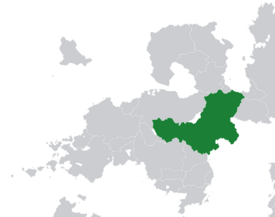First Luepolan Republic: Difference between revisions
No edit summary |
No edit summary |
||
| Line 7: | Line 7: | ||
|era = {{wp|Late modern period}} | |era = {{wp|Late modern period}} | ||
|year_start = 1818 | |year_start = 1818 | ||
|year_end = | |year_end = 1905 | ||
|life_span = 1818- | |life_span = 1818-1905 | ||
|event_start = [[ | |event_start = [[Luepolan Revolution of 1818]]<br><small>(Formation)</small> | ||
|date_start = | |date_start = 22 August | ||
|event1 = | |event1 = | ||
|date_event1 = | |date_event1 = | ||
| Line 22: | Line 22: | ||
|date_event5 = | |date_event5 = | ||
|event_end = Election of [[Lev Gincburg as President]]<br><small>(Dissolution)</small> | |event_end = Election of [[Lev Gincburg as President]]<br><small>(Dissolution)</small> | ||
|date_end = | |date_end = 31 December | ||
|event_pre = | |event_pre = | ||
|date_pre = | |date_pre = | ||
| Line 92: | Line 92: | ||
Having been a victorious power in the Caberran Wars under a republican system, Luepola transformed into a new stronghold of liberalism, spawning many authors and thinkers and hosting free and fair elections with universal suffrage for Luepolan male citizens. Luepola, at the time, was considered one of the most liberal strongholds in Patyria. Following the deposition of the Tieradan king in 1835, Luepolan diplomacy was key in preventing a renewed war effort against Tierada and allowing Tierada to remain as a republic, which it continued to this day. | Having been a victorious power in the Caberran Wars under a republican system, Luepola transformed into a new stronghold of liberalism, spawning many authors and thinkers and hosting free and fair elections with universal suffrage for Luepolan male citizens. Luepola, at the time, was considered one of the most liberal strongholds in Patyria. Following the deposition of the Tieradan king in 1835, Luepolan diplomacy was key in preventing a renewed war effort against Tierada and allowing Tierada to remain as a republic, which it continued to this day. | ||
The republic is commonly regarded as having ended in | The republic is commonly regarded as having ended in 1905, when the scheduled 1907 elections were postponed indefinitely by sitting president [[Lev Gincburg]]. This act marked the beginning of Luepola's transformation to a socialist one-party state, which would later be renamed the [[People's Republic of Luepola]]. Officially, the People's Republic regarded itself as the continuation of the First Luepolan Republic rather than a new government. | ||
{{Luepola Topics}} | {{Luepola Topics}} | ||
[[Category:Vasarden]] | [[Category:Vasarden]] | ||
[[Category:Luepola]] | [[Category:Luepola]] | ||
Revision as of 00:03, 29 September 2020
This article is incomplete because it is pending further input from participants, or it is a work-in-progress by one author. Please comment on this article's talk page to share your input, comments and questions. Note: To contribute to this article, you may need to seek help from the author(s) of this page. |
Republic of Luepola Respublika Ľupolska | |||||||||
|---|---|---|---|---|---|---|---|---|---|
| 1818-1905 | |||||||||
|
Flag | |||||||||
| Motto: Narod i Sloboda Naviek Nation and Freedom Forever | |||||||||
| Anthem: Marš Pobiede Victory March (1838) | |||||||||
| Capital | Prishek | ||||||||
| Official languages | Luepolan | ||||||||
| Common languages | |||||||||
| Government | Federal semi-presidential republic | ||||||||
| President | |||||||||
| Legislature | Sliet | ||||||||
| Great Assembly Veliki Sbor | |||||||||
| Popular Assembly Ľudovi Sbor | |||||||||
| Historical era | Late modern period | ||||||||
• Luepolan Revolution of 1818 (Formation) | 22 August 1818 | ||||||||
• Election of Lev Gincburg as President (Dissolution) | 31 December 1905 | ||||||||
| Population | |||||||||
• 1818 | 39,483,044 | ||||||||
• 1901 | 53,711,386 | ||||||||
| Currency | Luepolan Grivna (Ғ) | ||||||||
| |||||||||
The First Luepolan Republic (Luepolan: Prva Respublika Ľupolska), then known simply as the Luepolan Republic, was a a federal parliamentary republic in eastern Patyria that ruled from 1818 to 1900. During its existence, it was the largest country within Patyria (excluding colonial holdings). The republic was established by Igor Petrušić in the aftermath of the Luepolan Revolution of 1818, which saw the downfall of the stagnating Luepolan kingdom, and was modeled after the republican system recently established in Apelia and Tierada by Antonio de Caberra. Having come to power during the Caberran Wars, the newly-formed Luepolan Republic allied Tierada against the Vierz Empire during the second phase of the war; however, after Caberra began to demand tribute from the Luepolan Republic, the Luepolan Republic instead allied the Vierz in the third and final phase of the war, wherein Tierada was defeated and placed back under monarchic rule.
Luepola and Vierzland remained allies for the rest of the 19th century, having divided Tierada's former West Oridian holdings among themselves; however, towards the latter half of the 19th century, Luepolan popular opinion began to sway against Vierzland, particularly in the wake of the Thirteen Years' War and the Vonzumieran War of Independence.
Having been a victorious power in the Caberran Wars under a republican system, Luepola transformed into a new stronghold of liberalism, spawning many authors and thinkers and hosting free and fair elections with universal suffrage for Luepolan male citizens. Luepola, at the time, was considered one of the most liberal strongholds in Patyria. Following the deposition of the Tieradan king in 1835, Luepolan diplomacy was key in preventing a renewed war effort against Tierada and allowing Tierada to remain as a republic, which it continued to this day.
The republic is commonly regarded as having ended in 1905, when the scheduled 1907 elections were postponed indefinitely by sitting president Lev Gincburg. This act marked the beginning of Luepola's transformation to a socialist one-party state, which would later be renamed the People's Republic of Luepola. Officially, the People's Republic regarded itself as the continuation of the First Luepolan Republic rather than a new government.


